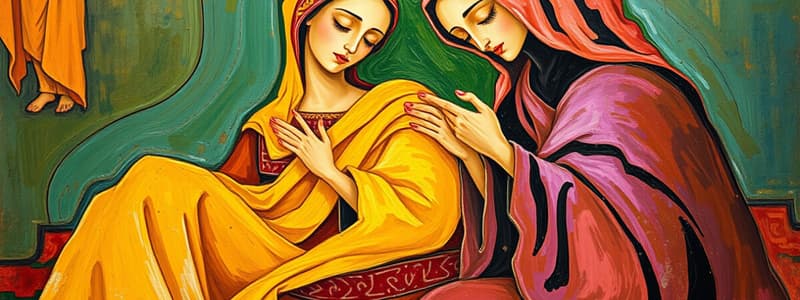Podcast
Questions and Answers
What was the primary responsibility of Shiphrah and Puah?
What was the primary responsibility of Shiphrah and Puah?
- To help build structures for the Pharaoh
- To educate Hebrew children
- To assist in childbirth for Hebrew women (correct)
- To enforce the Pharaoh's laws
What was Pharaoh's edict concerning newborn Hebrew boys?
What was Pharaoh's edict concerning newborn Hebrew boys?
- They should be raised as Egyptians
- They should be adopted by Egyptian families
- They must be killed to control their population (correct)
- They should be trained as soldiers
How did Shiphrah and Puah respond to Pharaoh's orders?
How did Shiphrah and Puah respond to Pharaoh's orders?
- They secretly complied but felt guilty
- They defied the orders and allowed the boys to live (correct)
- They followed the orders without question
- They reported other midwives who disobeyed
What excuse did Shiphrah and Puah provide to Pharaoh regarding their actions?
What excuse did Shiphrah and Puah provide to Pharaoh regarding their actions?
What was one consequence of Shiphrah and Puah's actions?
What was one consequence of Shiphrah and Puah's actions?
What themes does the story of Shiphrah and Puah illustrate?
What themes does the story of Shiphrah and Puah illustrate?
In what way are Shiphrah and Puah significant from a social perspective?
In what way are Shiphrah and Puah significant from a social perspective?
How are Shiphrah and Puah often referenced in modern discussions?
How are Shiphrah and Puah often referenced in modern discussions?
Flashcards are hidden until you start studying
Study Notes
Shiphrah and Puah: Hebrew Midwives
-
Historical Context:
- Shiphrah and Puah were Hebrew midwives mentioned in the Book of Exodus in the Bible.
- They served during a time when the Israelites were enslaved in Egypt.
-
Role and Responsibilities:
- Their primary duty was to assist in childbirth for Hebrew women.
- They played a critical role in ensuring the survival of newborn Hebrew boys amid Pharaoh's decree.
-
Pharaoh's Edict:
- The Pharaoh ordered that all newborn Hebrew boys be killed to control the growing population of Israelites.
- Shiphrah and Puah were instructed to carry out this order but chose to defy it.
-
Act of Resistance:
- Instead of complying, the midwives allowed Hebrew boys to live.
- They provided a clever excuse to Pharaoh, stating that Hebrew women gave birth too quickly for them to intervene.
-
Divine Favor:
- Due to their bravery and willingness to protect the innocent, God blessed Shiphrah and Puah.
- They were rewarded with families of their own, signifying God's favor and recognition of their actions.
-
Significance:
- Their story highlights themes of courage, faith, and the moral choice to protect life.
- Shiphrah and Puah are seen as early examples of civil disobedience against unjust laws.
- They represent the strength of women and their crucial role in family and community preservation.
-
Cultural Impact:
- Shiphrah and Puah are often referenced in discussions about women's rights, resistance, and the importance of compassion in leadership.
- Their legacy continues to inspire movements advocating for the protection of vulnerable populations.
Historical Context
- Shiphrah and Puah are Hebrew midwives from the Book of Exodus in the Bible.
- Their story unfolds during the enslavement of Israelites in Egypt.
Role and Responsibilities
- Primary role involved assisting Hebrew women during childbirth.
- They were vital in protecting the lives of newborn Hebrew boys against a royal decree.
Pharaoh's Edict
- The Pharaoh mandated the killing of all newborn Hebrew boys to regulate the Israelite population.
- Shiphrah and Puah were ordered to enforce this decree but chose to resist.
Act of Resistance
- The midwives opted to defy the Pharaoh's orders, allowing Hebrew boys to survive.
- They cleverly explained their actions to Pharaoh, claiming Hebrew women gave birth too swiftly for them to attend.
Divine Favor
- Their courageous actions earned them God's blessing.
- Shiphrah and Puah were rewarded with families, indicating divine recognition of their choices.
Significance
- Their story underscores themes of courage, faith, and moral responsibility in life protection.
- They exemplify early civil disobedience against unjust laws, emphasizing women’s strength and roles.
Cultural Impact
- Shiphrah and Puah are frequently cited in discussions surrounding women's rights and ethical leadership.
- Their legacy inspires advocacy for the rights of marginalized populations, emphasizing compassion and justice.
Studying That Suits You
Use AI to generate personalized quizzes and flashcards to suit your learning preferences.




